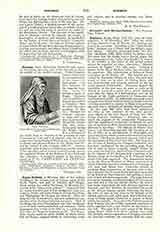
Saint Zita’s Home for Friendless Women
Founded at 158 East 24th Street, New York, by Ellen O'Keefe (Mother Zita) in 1890

Zita’s Home for Friendless Women, Saint, founded at 158 East 24th Street, New York, by Ellen O’Keefe (Mother Zita) in 1890. Born in County Limerick, Ireland, Miss O’Keefe emigrated to New York in 1864. She selected nursing as a career, and during her two years’ training at the city hospital, Blackwell’s Island, first conceived the idea which was to give a direction to her life. Moved with pity for the unfortunate women with whom she there came in contact and whose previous records were so fatal an obstacle to their securing employment, she determined to found a home where they could find shelter and an opportunity to reform their lives. With her personal savings she started single-handed the home in 24th Street, but was later joined by two friends (Mary Finnegan and Katherine Dunne). Every woman who sought admission was received without formal application and regardless of her religious views or previous character. This charitable work had from the first the approval of the ecclesiastical authorities, and as it became more widely known the greatly increased number of applicants necessitated its transference to larger quarters.
Miss O’Keefe had always treasured the thought of forming a regular community for the perpetuation of her work and to make reparation to Our Savior in the Blessed Sacrament. Archbishop (Cardinal) Farley approved her institute in September, 1903, under the title of the “Sisters of Reparation of the Congregation of Mary”. Miss O’Keefe was named superioress of the congregation under the title of Mother Zita, Katherine Dunne (Sister Mary Magdalen) taking the habit on her deathbed. A postulancy of one year and a novitiate of two years must be served; perpetual vows are made after five years. In 1906 Mother Zita visited her native land and returned with six novices, and the community now (1912) numbers fifteen members. Since 1907 a branch house has existed at East 79th Street. A sister always sleeps near the door, since it is a rule of the community that no one is to be refused admission at any hour, day or night; the observance of this rule frequently renders it necessary for the sisters to give up their own beds to their humble guests. The women are kept as long as they desire to stay; if ablebodied they must help in the laundr or at sewing, the sole support of the home; if ill, they are cared for or sent to the hospital. Catholic inmates are required to attend Mass on Sundays and holydays of obligation, but this is the sole distinction between the inmates of the different religions. The sisters also visit the poor in the hospitals, and supply free meals to men out of employment. The number of women accommodated each night is from 100 to 125; the meals supplied to men out of work averages daily 65.
MOIRA K. COYLE

